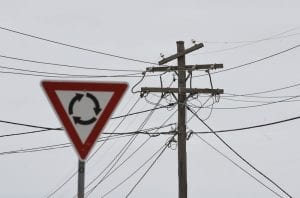What would happen if every house in the country had rooftop solar PV, and every small car was an electric vehicle?
The Australian Energy Market Operator has started to wrestle with at least part of that question, but it’s a question that New Zealand’s biggest power generator, Meridian Energy, has also been asking itself as it prepares for what it describes as the inevitable “green revolution”.
New Zealand – thanks to its extensive geothermal, hydro and wind resources – is already largely renewable. But in a recent presentation to analysts it painted a scenario where there was a $NZ100 tonne carbon price, 3.3 million battery electric vehicles charging daily and two million rooftop solar PV units (pretty much saturation on EV and solar uptake).
How would the electricity system cope?
Well, pretty easily as it turns out. This modelling below shows what a typical weekly generation profile would look like in 2043 under such a scenario.
The extensive hydro assets, and gas-fired peakers (little used in this scenario) provide the flexibility for the grid, and the NZ power system shows “remarkable resilience” to such changes.
“Our conclusion from then energy perspective is that it is not that big a deal,” Paul Chambers, the CFO of Meridian Energy, told RenewEconomy in an interview.
In fact, it would be a major benefit. The modelling shows no impact on average electricity prices, the electrification of the car fleet would cut fuel import costs, and it would reduce emissions because of the country’s largely emissions free generation fleet.
“A lot of countries have a problem with the idea of a green future. But we are already there,” Chambers said. “A lot of countries also have massive problems with the peakiness of the grid. All it takes is a little bit of smoothing of EV demand at night, and the grid can cope with enormous demand (for charging).”
Interestingly enough, the fact that New Zealand does have such a wealth of flexible generation means that household battery storage is probably not as valuable in that grid as it is in others. New Zealand also has relatively few houses with solar PV at the moment, and only around 550 EVs, although it has 50 charging stations.
Meridian says that battery storage is interesting for consumers because it can either enable customers to go off grid entirely, avoid peak pricing, or provide back-up in the case of black-outs. For networks, it helps manage the impact of solar PV and mitigates need for network upgrades.
But as for value in the whole system, Meridian notes that with extensive thermal and hydro capacity, the value of battery storage to the power system would be less than $NZ10/MWh, while its costs are over $NZ300/MWh.
And its estimates of the cost of households (average winter daily consumption 23kWh) going off-grid are also prohibitive: $NZ116,000. That, though, is based on some hefty costs for solar ($NZ3,333/kW) and for battery storage ($NZ4,000/kWh installed). That was pre-Tesla PowerWall, and probably also reflects the fact that there is not much of a solar supply chain in New Zealand.









